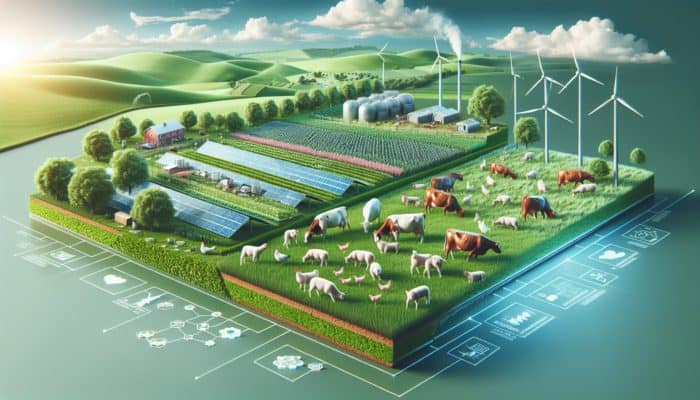Make Eco-Friendly Choices with Sustainable Meats
Select Grass-Fed Beef for a Healthier BBQ

How to Reduce BBQ Carbon Footprint: Opting for grass-fed beef is a powerful way to significantly reduce greenhouse gas emissions in comparison to conventional grain-fed options. This environmentally friendly choice not only enhances the quality of the meat you consume but also yields numerous benefits for the planet. Typically raised on pasture, grass-fed beef helps promote better soil health and fosters biodiversity. Additionally, it often boasts higher levels of omega-3 fatty acids and essential vitamins compared to its grain-fed counterparts. When shopping for grass-fed beef, seek out certifications from trusted organizations like the American Grassfed Association or USDA Organic to ensure sustainable farming practices are being followed.
Some notable advantages of choosing grass-fed beef include:
- Significantly lower greenhouse gas emissions when compared to grain-fed beef.
- An enhanced nutrient profile, which includes elevated levels of omega-3 and vitamins.
- Higher standards of animal welfare, as these cattle are often allowed to roam freely.
- Support for local and sustainable farming practices.
By prioritizing grass-fed options, consumers not only make a more sustainable choice but also contribute positively to the health of local ecosystems and communities.
Ready to Press Play?
Explore Delicious Plant-Based Alternatives for BBQ
Integrating plant-based alternatives into your BBQ menu can dramatically minimize the environmental impact typically associated with traditional meat dishes. Options like plant-based burgers and sausages are not just tasty but also demand considerably less water and land for their production compared to animal-based products. Popular brands such as Beyond Meat, Impossible Foods, and Field Roast have gained traction for their appetizing flavors and textures, making them appealing choices for both vegetarians and meat enthusiasts.
Consider these leading plant-based meat brands for your next BBQ:
- Beyond Meat
- Impossible Foods
- Field Roast
- Lightlife
- MorningStar Farms
These innovative products provide the delightful flavors and satisfaction of traditional BBQ fare while significantly contributing to a reduced carbon footprint. By choosing plant-based options, BBQ lovers can relish their favorite tastes without sacrificing the health of our planet.
Champion Local Farms for Sustainable BBQ Practices
Purchasing meat from local farms is an effective strategy for minimizing the transportation emissions associated with your BBQ. When you buy meat that has traveled a shorter distance, not only do you support local economies, but you also receive fresher and higher-quality products. Many local farms prioritize sustainable practices, which can further diminish the environmental impact of your meal and enhance its flavor.
Here are some helpful tips to discover local farms:
- Visit farmers' markets in your area for direct access to local producers.
- Utilize apps like Farmigo or LocalHarvest to find farms close to you.
- Explore community-supported agriculture (CSA) programs for regular access to fresh produce.
- Engage with local food cooperatives that emphasize regional farms.
Supporting local farms not only elevates the quality of your BBQ but also cultivates a deeper connection to your community and the food you consume.
Expert Tips to Effectively Minimize Your BBQ Carbon Footprint

What Are the Best Practices for Eco-Friendly Grilling?
To successfully achieve eco-friendly grilling, experts recommend selecting natural lump charcoal or propane as your fuel source, both of which produce fewer pollutants compared to traditional briquettes. The origin of your fuel plays a critical role in determining your BBQ's carbon footprint. For example, sourcing charcoal from sustainably managed forests can greatly diminish your environmental impact.
Real-world examples of eco-friendly grilling practices include:
– Using a charcoal chimney starter eliminates the need for lighter fluid, which can emit harmful chemicals.
– Grilling with a lid to retain heat, allowing for quicker cooking times and reduced fuel consumption.
– Pre-cooking certain items like vegetables in the oven to optimize cooking times before finishing on the grill.
By adopting these practices, grillers can significantly minimize their emissions, create mouthwatering meals, and demonstrate a strong commitment to sustainability.
How Can You Minimize Waste at BBQs?
Minimizing waste during BBQs can be accomplished through a few straightforward yet effective strategies. One of the most impactful methods is to utilize reusable plates and utensils instead of single-use items. This approach not only drastically reduces waste sent to landfills but also enhances the overall dining experience. Additionally, composting food scraps and recycling packaging materials can further decrease your environmental impact during gatherings.
Actionable steps for waste reduction at BBQs include:
– Establishing a composting station for organic waste to encourage guest participation.
– Inviting guests to bring their own reusable containers for leftovers.
– Carefully planning portions to prevent excess food waste.
– Providing clear recycling stations for the proper disposal of non-compostable items.
Implementing these practices can transform your BBQ into a sustainable event while educating guests about the importance of waste reduction.
What Role Does Fuel Choice Play in Reducing Emissions?

The choice of fuel—whether charcoal, propane, or electric grills—plays a crucial role in determining your BBQ's emissions. Propane and electric grills generally produce fewer pollutants compared to traditional charcoal grills. Moreover, electric grills frequently come equipped with energy-efficient features that can help further reduce fuel consumption.
Expert analysis on the environmental impact of different fuels reveals several key points:
– Charcoal, especially when sourced unsustainably, can lead to significant deforestation and emissions.
– Propane produces fewer greenhouse gases when burned compared to charcoal, making it a cleaner option.
– Electric grills can be powered by renewable energy sources, further decreasing their overall carbon footprint.
Choosing the appropriate fuel can profoundly impact the emissions generated during your BBQ, enabling you to enjoy delicious food while being kinder to the environment.
How Can Plant-Based BBQ Options Reduce Your Carbon Footprint?
Incorporating plant-based foods into your BBQ can dramatically lower emissions associated with meat consumption. Experts assert that vegetarian and vegan options can significantly reduce the overall carbon footprint of your meal, while also offering a diverse array of flavors and textures. Plant-based grilling is not merely a trend; it’s a smart choice for those striving to minimize their environmental impact.
The benefits of plant-based grilling include:
– Decreased carbon emissions linked to vegetable production as opposed to meat.
– A wider selection of options for guests, accommodating various dietary restrictions and preferences.
– The opportunity to highlight seasonal produce, enhancing freshness and flavor.
By focusing on plant-based BBQ options, you can craft a menu that delights the palate while honoring the planet and its resources.
Optimize Your BBQ Equipment for Sustainability
Upgrade to Energy-Efficient Grills for Better Performance
Investing in energy-efficient grills can lead to a substantial reduction in your carbon footprint. Modern grill models are designed to be more efficient, using less fuel and generating fewer emissions. Look for Energy Star-rated grills that comply with strict energy efficiency guidelines. This choice not only benefits the environment but can also result in long-term savings on your fuel expenses.
Upgrading to a new grill presents several advantages:
– Enhanced heat distribution, leading to even cooking and reduced fuel waste.
– Features such as automatic ignition systems that consume less gas.
– Improved temperature control to minimize cooking time and fuel usage.
By selecting an energy-efficient grill, you can savor your BBQ experience while simultaneously lowering your ecological footprint and saving money over time.
Maintain Your Grill for Optimal Efficiency
Regular cleaning and maintenance of your grill are vital for its efficient operation. A well-maintained grill not only utilizes less fuel but also produces fewer emissions. It’s essential to perform routine checks to ensure all components are functioning at their best and to clean the grill thoroughly after each use to prevent residue buildup that can impair performance.
Best practices for grill maintenance include:
– Scrubbing grates with a wire brush to remove residue before and after each use.
– Checking for leaks in gas lines or connections if using a propane grill.
– Regularly inspecting and replacing worn-out parts to maintain optimal efficiency.
– Conducting a deep clean at the beginning and end of each grilling season.
By adopting these maintenance practices, you can ensure your grill operates at peak efficiency, contributing to a more sustainable and enjoyable BBQ experience.
Select the Right Grill Size to Maximize Efficiency
Choosing a grill that suits your needs is essential to prevent unnecessary fuel consumption. A smaller grill is often more efficient for intimate get-togethers, while larger grills may be required for bigger events. Selecting the proper size not only optimizes fuel usage but also enhances the overall grilling experience.
To determine the right grill size for your needs, consider:
– The number of guests you typically host for BBQs.
– The types of food you plan to cook, as certain items may require more space.
– Your cooking style; if you prefer indirect grilling, a larger space may be necessary.
– Storage and portability; larger grills can be more challenging to manage and transport.
By choosing the appropriate grill size, you can maximize efficiency and minimize waste during your BBQ gatherings.
Why Reducing Your BBQ Carbon Footprint Matters
Environmental Impact Reduction for a Sustainable Future
Lowering your BBQ's carbon footprint contributes to a healthier planet by significantly decreasing greenhouse gas emissions. Each decision made at the grill can have a ripple effect on the environment. From the type of meat selected to the fuel used, every component plays a crucial role in influencing the overall impact of your BBQ.
Specific environmental benefits from reducing BBQ emissions include:
– A marked decrease in contributions to climate change through lowered greenhouse gas output.
– Enhanced air quality by minimizing pollutants released during grilling.
– Conservation of vital resources like water and energy by opting for sustainable practices.
By understanding the environmental implications of your BBQ choices, you can take meaningful steps toward a more sustainable future, benefiting both the planet and future generations.
Healthier Grilling Options for Better Nutrition
Utilizing less polluting fuels and selecting sustainable meats can lead to healthier food choices for you and your guests. Eco-friendly grilling not only supports environmental health but also reduces exposure to harmful chemicals often present in processed meats. This emphasis on quality ingredients can significantly enhance your overall health and well-being.
How eco-friendly grilling improves personal health includes:
– A reduction in carcinogens associated with grilling over direct flames, particularly when using sustainable fuels.
– An increased intake of nutrients by incorporating more vegetables and plant-based options into your BBQ menu.
– Fewer preservatives and additives are found in processed meats, leading to healthier meal choices.
By making healthier choices in your BBQ practices, you're not only grilling with a focus on the environment; you're also prioritizing your health and well-being.
Cost Savings Through Sustainable BBQ Practices
Implementing efficient grilling practices and making sustainable choices can lead to significant long-term savings on fuel and food costs. While the initial investment in sustainable meats and energy-efficient equipment may be higher, the cumulative savings over time can be considerable. As energy prices fluctuate, utilizing a more efficient grill means lower fuel expenses.
Financial benefits of eco-friendly grilling include:
– Reduced fuel costs due to lower consumption and more efficient equipment.
– Potential savings from purchasing local and seasonal produce, which is often more affordable.
– Decreased costs related to waste disposal, as minimizing food waste leads to fewer expenses.
By adopting eco-friendly grilling practices, you not only support the planet but also realize tangible savings in your BBQ-related expenses.
Fostering Enhanced Social Responsibility Through Sustainable Choices
Embracing eco-friendly BBQ practices showcases your commitment to sustainability, fostering community appreciation, and motivating others to adopt greener habits. By setting an example, you can engage friends and family in discussions about sustainability and inspire collective action toward environmental responsibility.
How reducing your BBQ's carbon footprint contributes to social good includes:
– Raising awareness about sustainable practices in food consumption.
– Creating a sense of community around shared values of environmental stewardship.
– Inspiring others to reflect on their own grilling habits and their impact on the planet.
Your BBQ can become a platform for advocacy, demonstrating how enjoyable and fulfilling sustainable practices can be for everyone.
Proven Strategies for Effectively Reducing Your BBQ Carbon Footprint
Implement Efficient Cooking Techniques for a Greener BBQ
Integrating efficient cooking techniques can drastically reduce fuel consumption and emissions during your BBQ. Techniques such as indirect grilling, using a lid, or batch cooking can maximize efficiency while enhancing flavor. Thoughtful planning of your cooking approach is crucial for minimizing your carbon footprint.
Expert analysis on efficient grilling techniques reveals:
– Indirect grilling: This method allows for slower cooking, requiring less heat and fuel consumption.
– Using a lid: Covering the grill retains heat and reduces cooking time, leading to significant fuel savings.
– Batch cooking: Preparing multiple items simultaneously optimizes the use of the grill and minimizes fuel waste.
By mastering these techniques, you can enjoy delicious meals while being considerate of the environment and its resources.
Plan Your BBQ Menu Wisely to Promote Sustainability
Selecting a thoughtful menu that utilizes less meat or incorporates more vegetables can significantly reduce your BBQ's carbon footprint. A well-planned menu also enhances the variety and appeal of your BBQ, creating an inviting experience for all attendees.
Considerations for menu planning to reduce BBQ emissions include:
– Highlighting plant-based proteins and seasonal vegetables as main attractions.
– Offering a mix of meat and vegetarian options to cater to diverse dietary preferences.
– Utilizing whole ingredients and fresh produce to minimize processing and waste.
By planning your BBQ menu with sustainability in mind, you can craft a delightful experience that aligns with your eco-friendly goals.
Educate Your Guests on Sustainability at Your BBQ
Sharing your eco-friendly practices with your guests can help spread awareness and encourage more sustainable behaviors. By cultivating a culture of sustainability at your BBQs, you inspire others to reflect on their habits and make conscious choices about their consumption.
Real-world examples of educating guests on sustainability at BBQs include:
– Discussing the benefits of local sourcing and sustainable meats while serving.
– Sharing tips on reducing food waste and composting food scraps during the event.
– Providing resources or literature on sustainable practices for guests to take home.
By investing time in educating your guests, you can create a ripple effect that encourages wider community engagement in sustainable practices.
How Can You Make Your BBQ More Sustainable and Enjoyable?
Utilize Reusable and Biodegradable Products for Waste Reduction
Transitioning to reusable plates, cups, and utensils, or choosing biodegradable options, can significantly reduce the waste generated during your BBQ. By making this switch, you not only cut down on landfill contributions but also promote a culture of sustainability among your guests.
Best reusable products for BBQs include:
- Stainless steel or silicone utensils that can handle high temperatures.
- Reusable cloth napkins that add a touch of elegance to your dining experience.
- Compostable plates are made from materials like sugarcane or bamboo.
- Glass or stainless steel drinkware that is both durable and stylish.
By incorporating these products into your BBQ, you set an example for responsible consumption and inspire others to adopt similar practices for their events.
Incorporate a Wider Variety of Vegetables into Your Menu
Vegetables typically have a lower carbon footprint than meat, making them an excellent choice for a more sustainable BBQ. Grilling a range of vegetables can not only enhance the flavor and visual appeal of your meal but also provide a healthier alternative for your guests.
To elevate the flavors of grilled vegetables, consider:
– Marinating vegetables in olive oil, herbs, and spices before grilling to enhance taste.
– Skewering pieces for even cooking and an attractive presentation.
– Exploring diverse types of vegetables, such as bell peppers, zucchini, and eggplant.
– Incorporating seasonal produce to celebrate local flavors and freshness.
By increasing the vegetable content in your BBQ menu, you create a more sustainable and health-conscious dining experience for everyone involved.
Focus on Reducing Food Waste at Your BBQ
Carefully planning your portions is essential to avoid leftovers and minimize food waste during BBQs. By being mindful of how much food is prepared, you can ensure that meals are thoroughly enjoyed without excessive disposal.
Effective strategies for reducing food waste at BBQs include:
– Encouraging guests to serve themselves and only take what they can eat.
– Providing to-go containers for guests to take home any leftovers.
– Composting any food scraps that cannot be consumed, ensuring they are returned to the earth where they belong.
By prioritizing waste reduction, you can make your BBQ not only enjoyable but also a responsible celebration of good food and community.
Continuously Monitor and Adjust Your BBQ Practices for Improvement
Track Your Carbon Footprint for Sustainable Insights
Utilizing apps or calculators to monitor your BBQ's carbon footprint is an effective way to gauge your environmental impact. By analyzing this data, you can make informed decisions and adjustments to your practices, leading to a more sustainable BBQ experience.
To accurately track your BBQ's carbon footprint:
– Use carbon footprint calculators that consider fuel type, food choices, and the amount of waste generated.
– Maintain a log of the types of foods and quantities served at various events.
– Analyze the data over time to identify trends and pinpoint areas for improvement.
By actively tracking your carbon footprint, you can set achievable goals for reduction and witness positive transformations in your BBQ practices.
Stay Informed on New Grilling Technologies for Enhanced Sustainability
Staying informed about new grilling technologies can further reduce emissions and enhance overall efficiency. As the grilling industry evolves, innovative enhancements are emerging that can make cooking not only more enjoyable but also more sustainable.
Considerations for the latest eco-friendly grilling technologies include:
– Smart grills that optimize temperature and cooking time to conserve fuel.
– Solar-powered grills that harness renewable energy for cooking.
– Grills with advanced insulation that retain heat more effectively, requiring less fuel.
When possible, consider upgrading to new technologies that align with your sustainability objectives. By staying informed, you can make educated decisions that benefit both your BBQ and the planet.
Encourage Community Involvement for Greater Impact
Engaging your community in sustainable BBQ practices can amplify the effects of your individual efforts. By sharing knowledge and fostering a sense of collective responsibility, you can nurture a culture of sustainability that extends beyond your personal gatherings.
Ways to encourage community involvement include:
– Organizing community BBQ events centered around sustainability and local sourcing.
– Collaborating with local farms or organizations to educate others on sustainable practices.
– Creating forums or social media groups to share tips and experiences related to eco-friendly grilling.
By involving your community, you foster a shared commitment to sustainability that can lead to meaningful and lasting change.
Regularly Evaluate and Modify Your Techniques for Continuous Improvement
Periodically assessing your BBQ methods allows you to make adjustments that enhance efficiency and reduce environmental impact. As you gain knowledge about sustainable practices, it’s essential to integrate these insights into your grilling routine.
How often should you review and change your BBQ practices?
– Schedule evaluations after each grilling season to identify what worked well and what could be improved.
– Stay engaged with new trends in sustainability and incorporate them into your BBQ habits.
– Solicit feedback from guests regarding their experiences, providing valuable insights for future improvements.
By regularly evaluating and modifying your techniques, you ensure that your BBQ remains a celebration of both delicious food and environmental responsibility.
FAQs About Sustainable BBQ Practices
How can I reduce my BBQ carbon footprint?
You can reduce your BBQ carbon footprint by selecting sustainable meats, utilizing energy-efficient grilling equipment, minimizing waste, and opting for plant-based options that lower emissions.
What are some eco-friendly grilling practices?
Eco-friendly grilling practices include using natural charcoal, employing indirect grilling methods, and maintaining your grill properly to enhance fuel efficiency and reduce emissions.
Why is grass-fed beef more sustainable?
Grass-fed beef is more sustainable because it typically results in lower greenhouse gas emissions, supports higher animal welfare standards, and promotes biodiversity in grazing practices.
Can I grill vegetables?
Absolutely! Grilling vegetables is an excellent way to enhance their flavors, and they have a significantly lower carbon footprint compared to traditional meat options.
What’s the best way to compost food scraps from BBQs?
To compost food scraps, set up a compost bin at your BBQ, include a mix of greens (vegetable scraps) and browns (dry leaves), and regularly turn the pile for aeration to promote decomposition.
How can I engage my guests in sustainability?
You can engage your guests in sustainability by sharing your eco-friendly practices, discussing the importance of reducing waste, and motivating them to adopt similar responsible habits during and after the event.
What are some popular plant-based BBQ brands?
Popular plant-based BBQ brands include Beyond Meat, Impossible Foods, and Field Roast, which provide a variety of delicious alternatives to traditional meat products.
What are the benefits of using reusable products?
Using reusable products significantly reduces waste, fosters sustainable habits, and is often more cost-effective over time when compared to single-use items that contribute to landfill overflow.
How can I plan my BBQ menu to be more sustainable?
To plan a sustainable BBQ menu, include more plant-based dishes, source ingredients locally, and minimize portion sizes to reduce food waste effectively.
What’s the role of fuel choice in BBQ emissions?
Fuel choice is critical in determining BBQ emissions, as options like propane and electric grills generally produce fewer pollutants compared to traditional charcoal grills, making them cleaner alternatives.


